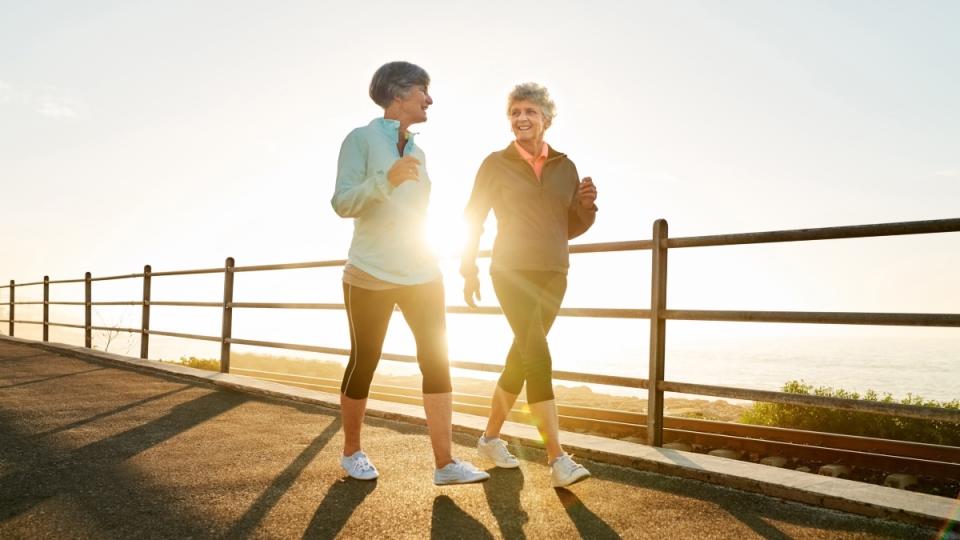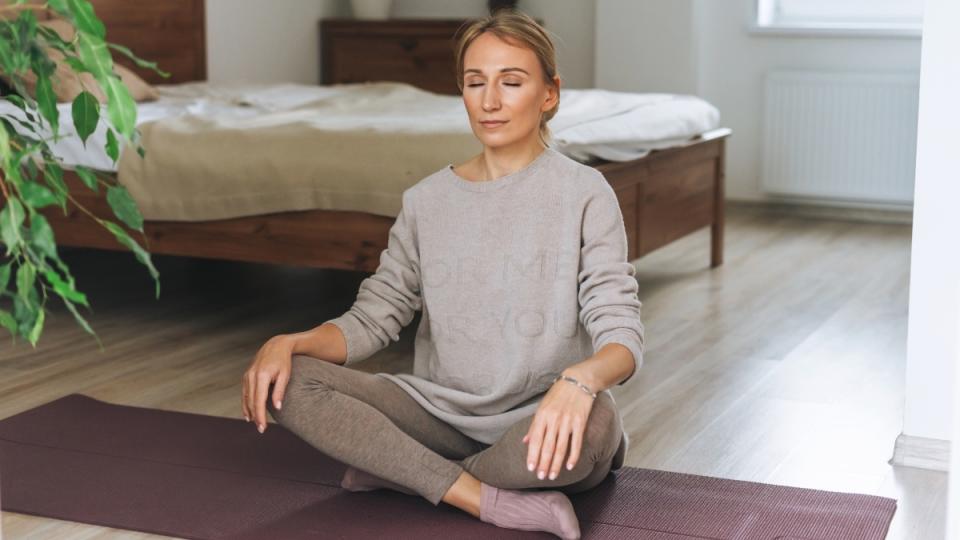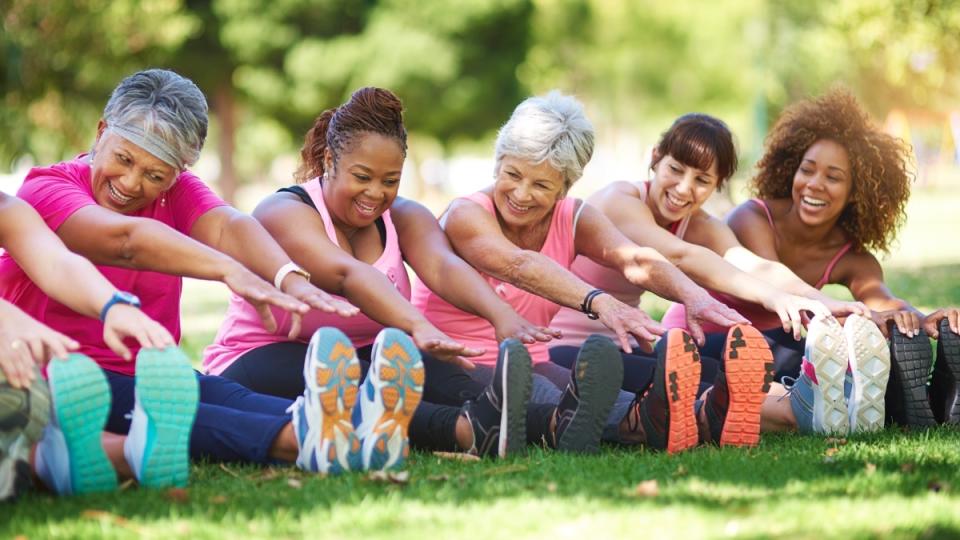Fitness Experts Reveal the Best Time To Work Out + Easy Hacks That Boost the Benefit of Any Exercise
It's no secret that regular exercise is one of the best things you can do for your health and wellbeing. But is there a best time to work out, and does it matter whether you stick to it?
First, give yourself a pat on the back for if you're lacing up your sneakers at least a couple times per week. An active lifestyle boosts your heart health, strengthens your muscles and bones, improves your balance and posture and perks up your mood, explains Carol Michaels, ACE, ACSM, a certified personal trainer in West Orange, NJ. "It can improve quality of life by making activities easier and more enjoyable," she adds.
But if you want to reap even bigger benefits, you may want to start considering the clock. Turns out, you can maximize the good that comes from a work out simply by doing it at the right time of day based on what you want to achieve. Here's what you need to know.
What is the best time to work out?
As you might have guessed, there's no one-size-fits-all time to work out that's optimal for everyone. Both morning and afternoon or early evening workouts have their pros and cons, so finding the best time to work out for you comes down to your lifestyle and fitness goals.
"Some people are early rises and can make time for a workout before they start their day, while some have more energy at the end of the day," Michaels says. "The best time to exercise is whenever you can do the workout."
The benefits of a morning workout
The major advantage of morning exercise is simply that your workout is more likely to actually get done. Often, "too many unexpected circumstances can come up during the day, putting your [afternoon or evening] workout on the backburner," says Kathy LaBella, RDN, ACE-CMES/CPT, a registered dietitian nutritionist, medical exercise specialist and certified personal trainer in Old Saybrook, CT. If you've ever planned take a walk after work only to get derailed by a flat tire or a neighbor popping by unexpectedly, you're probably nodding your head right now!

Making time to work out in the AM might support your weight loss goals, too. Women were less likely to be distracted by pictures of tempting foods after taking brisk 45-minute morning walks compared to the days they didn't exercise, found a study in Medicine and Science in Sports and Exercise. That might make it easier to resist crave-worthy treats throughout the day, like a second helping of sides at dinner or a double scoop when the ice cream truck rolls through your neighborhood.
On the down side? You might have to wake up earlier and still feel pretty groggy when you exercise first thing. And if you get moving before you've eaten breakfast, your energy levels might not be at their peak, says LaBella.
The benefits of an afternoon or evening workout
As for exercising in the afternoon or early evening? If you can consistently make time for it and it doesn't affect your sleep, the timing can have its perks. Our performance tends to peak around mid-afternoon thanks to a natural rise in body temperature, according to a Scandinavian Journal of Medicine & Science in Sports study.
As a result, "you may have more strength and energy" to push yourself in the afternoon compared to first thing in the morning, when you're not fully awake yet, LaBella notes. Afternoon workouts may also do more to promote steady blood sugar levels, which is especially important for people with type 2 diabetes, found a study in Diabetologia.
And if you want to work out right before bed, the time really comes down to personal preference. Most people's energy levels are lower after a long day, so it's not uncommon to feel sluggish during a late exercise session, LaBella points out. But if you feel like you've got the stamina and the timing works for your schedule, go for it! Despite what you might've heard, moderate exercise before bed doesn't make it harder to fall asleep, a Sports Medicine review concluded.

Related: This Relaxing Type of Physical Exercise Can Ease Restless Leg Syndrome + Improve Sleep
6 ways to maximize your workout
No matter what time you decide to work out, you can boost the benefits of your fitness routine with a few simple tweaks.
1. Dedicate a "workout hour"
It doesn't matter what time it is, and it doesn't actually have to be an hour (half an hour is great!). But you can up the odds that you stick with an exercise routine simply by choosing a regular time where you know you'll be active, LaBella says.
That's important, since exercising consistently (five times per week) gives you the biggest workout bang for your buck. Not only will regular workouts improve your fitness level, the regular calorie burn makes it easier to lose weight, suggests research in Exercise and Sport Science Reviews. (Learn how fascia exercises and a type of walking workout called rucking can speed weight loss.)
2. Pair up with a pal
Invite a friend along for your walk or to play pickleball. Knowing you're meeting a friend keeps you accountable, so you're less likely to skip out, Michaels says. You might even end up pushing yourself a little harder. Exercise participants held plank poses for 24% longer when they did it next to someone else compared to when they held the pose on their own, a Journal of Sport and Exercise Physiology study found.
If your friends aren't fitness fanatics or your schedules don't mesh, try checking out a group exercise class. "Sometimes the friendships that develop in classes leads you to show up consistently, which leads to good results," says Michaels.

3. Play your favorite tunes
Cue up a fun playlist before you get moving. Nearly a quarter of exercisers say that listening to music pushes them to go harder or longer and makes their workout feel easier, found a study conducted by the International Council for Health, Physical Education, Recreation, Sport, and Dance.
There's no one best type of music for exercise, so pick something you like with a beat that matches the pace you want to maintain. Why? Working to stick with the rhythm will help you keep up, suggests a PLoS One study.
4. Sip a cuppa joe
The caffeine jolt will give you a natural boost so you can give your workout your all, according to a review in the Journal of the International Society of Sports Nutrition. "It stimulates the center nervous system to provide increased energy and enhance sports performance," LaBella explains. You'll get the biggest benefits when you have caffeine about an hour before exercising, the study authors note. Prefer your coffee with a splash of cream? Check out our easy (and delicious!) homemade coffee creamer recipe.

5. Sport something red
Don a scarlet t-shirt or slip a fire engine red scrunchie on your wrist the next time you go to work out. Seeing the bright color sets off alarm bells in your brain (even though you're not actually scared or in danger), which can give you a burst of energy while you're exercising, found a study in Emotion.
6. Switch up the pace
Try alternating between a moderate and more brisk speed throughout your workout to burn more calories while upping your stamina. Switching between 60 seconds of jogging and 90 seconds of walking, for example, melts more body fat than walking alone, suggests a Journal of Clinical Medicine review.
Or if you'd prefer to keep a steady speed while strolling, try switching up the incline while walking on a treadmill, Michaels suggests. "If you want to get results, you may have to start changing up your exercise routine," she explains. No treadmill? No problem! Stroll around a neighborhood that naturally has a few small hills to mix things up.
Some of our favorite health-boosting exercises:
Fascia Exercises Are the 10-Minute Routine Helping Women Get One Size Smaller — Fast!
This Relaxing Type of Physical Exercise Can Ease Restless Leg Syndrome + Improve Sleep
Yoga for Menopause Helps Tame Hot Flashes, Irritability, Fatigue and More, Experts Agree
This content is not a substitute for professional medical advice or diagnosis. Always consult your physician before pursuing any treatment plan.
